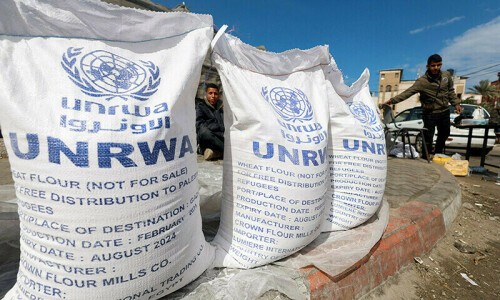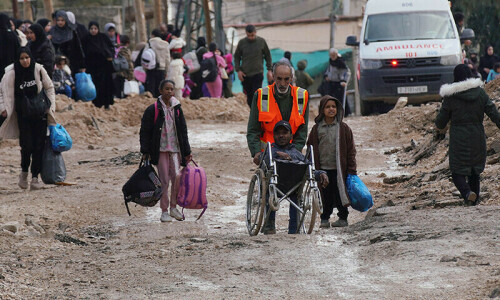KARACHI, July 3: Speakers at a consultative workshop on Thursday noted that the depletion of mangroves in the Indus delta and elsewhere in the province continued unabated as government departments and agencies lacked a well thought out strategy and capacity to ensure the conservation and rehabilitation of the forests.
It was stated that the mangroves were the principal component of the delta ecosystem, supporting, among other species, the commercial fish species and various wildlife species, and acted as a natural barrier against storms and reduced the chances of soil erosion as well.
However, poor surveillance and expansion activities could not adequately be put in place in the case of the important forest due to incapacitated governmental instruments and conflicts over the ownership of the mangrove areas along the coastal and deltaic areas, it was further observed.
The workshop, organised under the auspices of the federal environment ministry to assess environmental issues in order to prepare a national action plan and capacity building of relevant institutions, organisations and individuals through some foreign funding, concluded on Thursday after two days’ deliberations involving the stakeholders from the government, non-governmental organisations and experts in the environment sector.
In Sindh, the forest department and the board of revenue own around 550,000 hectares of mangroves, but only about 73,000 hectares now actually have mangroves. The Karachi Port Trust (KPT) and the Port Qasim Authority have 900 and 64,000 hectares – respectively – with mangroves.
Rashid Yahya Usmani of the KPT, who headed a group supposed to recommend action for the future, informed the participants that his organisation was managing mangroves in a proper manner, but was ready to welcome technical support offered by the Sindh forest department, if it had any, in the light of some decisions reached at a meeting held with the chief secretary of the province about five weeks back.
During the group work, it was felt that a delay in the settlement of long prevailing ownership conflicts on various mangrove lands, changes in the expansion of sand dunes, non-flow of fresh water into the sea, and unchecked cutting and sale of mangroves had been contributing to the depletion of mangroves.
The government should review the related laws on mangroves and also enhance coordination among the different department, along with providing funding for initiatives being planned against an overall process of desertification that continued in the country, the speakers added.
Discussing the different heads related to desertification, such as forests/trees, agriculture, rangelands, farmlands plantation, water conservation, wildlife and water bodies, the participants also urged the government to give priority to desertification issues and take measures to mitigate the effects of drought, and allocate adequate funds for the improvement of productivity of land and rehabilitation and conservation and sustainable management of land and water resources.
Named the National Capacity Self-Assessment workshop, the event aimed at identifying the country level priorities and needs for capacity building to protect the local as well as global environment with special reference to the three Rio de Janeiro conventions — the United Nations Convention on Biological Diversity (1992), the United Nations Framework Convention on Climate Change (1992) and the United Nations Convention to Combat Desertification (1994).
Commenting on the low participation of the stakeholders on the second day of the workshop, one of the organizers, Iftikhar Durrani, deplored that despite invitations, representatives from various departments and institutions, including universities, research institutions, researchers in oceanography, provincial and district officials on environment, representatives of fisheries and irrigation organisations, did not turn up.
“With their participations, we could have got more and varied input for solution of environmental issues in the province,” he said.
According to an official of the environment wing of the federal government, Saeed Ahmed, similar workshops would be held in a few other cities including, Quetta, Lahore, Muzaffarabad and Islamabad, during July, following which the NCSA report and an action plan would be finalised.
















































Dear visitor, the comments section is undergoing an overhaul and will return soon.